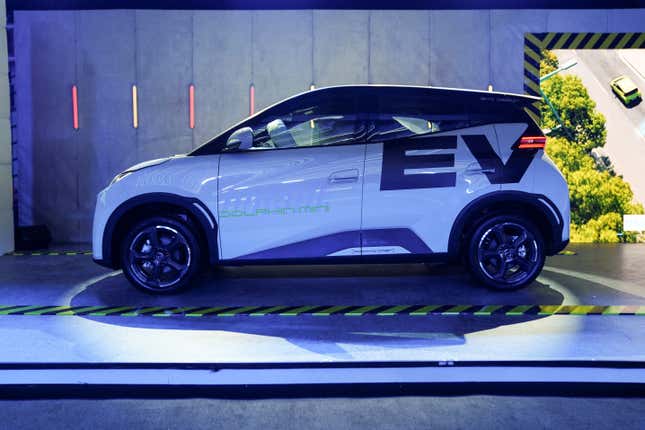
Tesla rival BYD reported strong sales in March as competition in the world’s largest auto market intensifies.
The Chinese electric vehicle maker sold 626,263 new-energy vehicles — a category that includes both plug-in EVs and battery EVs — in March, up 13% from a year prior. BYD said sales climbed 46% after falling in January and February.
BYD has been a key player in a growing price war in China as local and foreign competitors clash for a slice of the market. The Shenzhen, China-based automaker has repeatedly slashed prices and introduced new vehicles across its brands, including the super-cheap e2 and Seagull electric hatchbacks.
Several carmakers, including Hyundai Motor and the General Motors-backed joint venture SAIC-GM-Wuling, have retaliated with their own price cuts or increased incentives. Elon Musk’s Tesla slashed prices earlier this year, but increased the cost of its Model Y lineup Monday.
There have also been newcomers into the market, such as smartphone maker Xiaomi. Some traditional automakers have considered pulling out of the market or partnering up to survive.
Warren Buffett-backed BYD has been buoyed by generous subsidies from Beijing, which has heavily invested in many local automakers to spread its reach in the burgeoning EV market. Chinese car exports have surged in recent years and Japan — the world’s top exporter of cars since 2017 — lost that title to China last year.
BYD — which sells its products in more than 50 countries, including Japan and Australia — has said it won “first place” in NEV sales in “many countries” in 2023. On Monday, BYD said overseas exports nearly tripled to 38,434 units.
The automaker last month said it expects China’s NEV market to grow strongly in 2024 and that it will continue to expand globally. The company plans to build a new factory in Hungary, revitalize a former Ford Motor Co. manufacturing hub in Brazil, and has showed interest in building a new factory in Mexico.
Several other Chinese carmakers reported strong results in March.
Li Auto reported a 53% jump in deliveries compared to a year prior, while Nio posted a 14% increase year-over-year. Xpeng delivered 9,026 smart EVs, a 99% increase compared to February and 29% jump year-over-year; Geely Automobile sold 475,720 cars, up 49% year-over-year.
Austin, Texas-based Tesla, which is expected to report global sales for its first quarter Tuesday, said deliveries sank in February. Insurance data tracked by CnEVPost shows a 5% year-over-year decline in China over the past 12 weeks. Analysts largely expect Tesla to fall below Wall Street’s expectations, capping off a “nightmare” first quarter.
BYD, Li Auto, and Xpeng stock were up more than 1% in Monday trading. Nio stock iwas up more than 2%. Geely stock slightly nudged up, while Tesla stock was down nearly 3%.